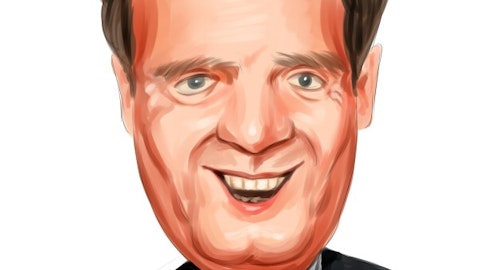Richard Newitter: Okay, thank you very much.
Operator: Thank you. One moment please for our next question. Our next question will come from Neil Chatterjee of B. Riley. Your line is open. Pardon me, Neil Chatterjee, your line is open. If your phone is on mute, please unmute your line. If you’re using a headset, please put on your headphones. Pardon me, Mr. Neil.
Kevin Waters: Go to the next one.
Operator: Thank you. One moment. And again, one moment for our next question. The next question will come from Brandon Vasquez of William Blair. Your line is open.
Brandon Vazquez: Hi, everyone. Thanks for taking the call. One, maybe a quick clarification question and a little bit about future plans. On the capital rep side, I think you had just mentioned you’d exit this year with somewhere between 35 to 40. Are you able to shore us up on where you are today? And then as you look to next year, I think you discussed before that there’s room for further expansion. As you look to 2024, do you hire a cohort for 2024 as we go into the year, or do you hire that cohort in 2024? Any updated thoughts around that?
Reza Zadno: We’re probably, in regards to cadence we’re about halfway, to be fair, to where we want to be. So, think of around 35 sitting here today, which means we have another class of probably five coming in here in the next two months. I’d also suggest that in 2024, the plan isn’t to stop, but at the same time, I don’t think we’re in a position to call out the exact number of capital folks we’re going to add. As the business gets more complicated and we get into more accounts, it’s not just going to be capital reps we hire. We’re looking at things like strategic account managers. We’re looking at key accounts. We’re looking at IDN relationships. So, I think it becomes a little messier so to speak in 2024, but we definitely continue to plan to invest in that business.
But we still want to make sure we’re investing responsibly, making sure we’re not sacrificing outcomes, making sure we’re not moving too fast, being very methodical about how we have to keep a little organization.
Brandon Vazquez: Okay. Thanks. So, then internationally I mean you guys have had a couple of nice wins, especially in the U.K. You’ve mentioned that you might step up investments in the U.K. through 2024. Can you talk a little bit about what those investments are, when that can accelerate? I mean, you have good reimbursement there. You have endorsements. You’re making some investments. Is there any reason that U.K. opportunity can’t be a high-growth area or as high of a growth of an area that we’re seeing in the U.S?
Reza Zadno: Definitely, we are very pleased with another solid quarter we have from international. Our international strategy has always been to market development and working with KOLs and increase awareness. As you mentioned, recent announcement by NICE, having this third arrangement is a great driver and catalyst for our product in the U.K. For that, we will increase our sales infrastructure in the U.K. And international, definitely Japan staying more focused on U.K., our immediate action will be increasing infrastructure. But, I’m going to let Kevin…
Kevin Waters: I just think the only point I’d add to Reza’s comments is I don’t believe our commentary around investing more in the U.K. is going to change kind of the OpEx leverage of the business. So, I think we’re investing in the U.K., but it will be absorbed into the run rate of the company as opposed to anything materially incremental if you’re thinking about it from an OpEx standpoint.
Reza Zadno: From an opportunity point of view, international, we are targeting those geographies that is a great market. We see international as a great opportunity, but we are moving very methodically and making sure we have the endorsement and KOL and awareness in place.
Brandon Vazquez: Got it. Thanks a lot for taking the questions.
Operator: Thank you. One moment for our next question. Our next question will come from Neil Chatterjee of B. Riley. Your line is open. So, Neil Chatterjee, your line is…
Kevin Waters: We’ll send Neil a separate note. Why don’t we keep moving here? I think Neil’s having technical issues. We’ll try and…Let’s put him at the end and see what happens.
Operator: Okay. Thank you. One moment please for our next question. The next question will come from Nathan Treybeck of Wells Fargo. Your line is open.
Nathan Treybeck: Hi, guys. Congrats on the great quarter. I just want to…Can you just touch on the drivers of system ASP variability quarter-to-quarter? I think generally there were expectations that ASP will be down, sequentially in Q1 and then kind of stable Q2 through Q4. So, maybe if you could just touch on what was driving the variability? Thanks.
Reza Zadno: Yes. Thanks, Nathan. So look, we’ve mentioned this on previous calls, and we have talked kind of about our overall mission to partner with our hospital customers, drive procedure growth, and gain market share. And, we do have internal limits for so to speak on pricing. But at the same time, we are willing to negotiate on capital. And if that means we can get a system in sooner, if we have a committed surgeon that we know is going to do a lot of volume, we will be willing to negotiate on pricing. And I think you are going to start to see in our business some seasonality, not only in system sold, but also in system ASPs. And it appears to us that Q1 and Q3 appear to be, I would say, a weaker capital quarter where, we’ve seen ASPs now be roughly in the 350 to 355 range.
But we saw Q2, as you pointed out, at 370. And when we look at the funnel in Q4, we see an increase in Q3. So I do think there’s just going to be some quarter to quarter variability. But at the same time, when we make the decision on price, it’s always in light of the bigger opportunity and how fast can that hospital become an Aquablation standard-of-care center, so to speak. And that’s a tradeoff, we’re willing to make. And it’s individual negotiations with each hospital. What we don’t have as a management team, any concerns kind of about our long-term capital pricing and our ability to get a fair price and a fair margin for our system.
Nathan Treybeck: Okay. Thanks for that. And then in terms of just system sales outside the U.S., they were down pretty meaningfully quarter-to-quarter. Can you just talk about what drove this and I guess your outlook for Q4 and then maybe into 2024? Thanks.



